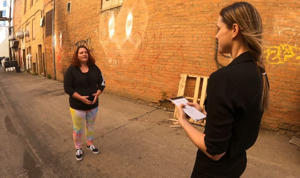Bismarck woman shares her story of human trafficking, hopes to help others

BISMARCK, N.D. (KFYR) – Human trafficking is called the “modern day slavery.” It involves the use of force, fraud or coercion to make another person work or engage in sex, and it happens in North Dakota. The North Dakota Human Trafficking Task Force has worked to help more than 650 victims of human trafficking since 2016. Most were North Dakota residents, and most trafficking is “familial,” meaning a family member is the trafficker.
For victims, getting out and rebuilding can be difficult and even more so when you have a child in common with the trafficker. Your News Leader spoke with one Bismarck woman who's sharing her survivor story.
As Nikki Blowers took a drive through Bismarck, she remembered a different drive 16 years ago.
“I just got in the car, and I said, ‘hey man, help me, help me, please,'” said Nikki Blowers, Bismarck resident and human trafficking survivor.
Nikki had been sex trafficked. She requested help from a man who was supposed to be a “date.” It was a big risk. “Something compelled me to ask him, I guess. Maybe it was because I saw he was a Marine and I come from a long line of servicemen,” said Nikki.
She said he helped her escape. But after her escape came the years of rebuilding and healing.
Part of the process? Reframing her story.
“The tattoo was in her flowers,” said Nikki, pulling up a picture on her phone.
She said a local tattoo artist covered up a large, dark tattoo she had been branded with by those who trafficked her. Now it's an elegant sugar skull.
“I got on my knees and cried. I thought I would have to carry that around my whole life,” said Nikki, remembering the moment she saw the new artwork.
Stacy Schaffer, the founder of 31:8 Project, said Nikki's story of human trafficking rings true for more people than you might think. “It's not just a large city issue, it's also a rural community issue,” said Stacy Schaffer, executive director and founder of 31:8 Project.
She said traffickers are manipulators.
“People always ask, ‘why don't individuals just leave their trafficker?' And it's not that simple. When we talk about things like trauma bonding or Stockholm syndrome, traffickers have a way of manipulating their victims to the point where it's like they are rewiring their brain to think a certain way,” said Schaffer.
Their victims aren't usually kidnapped. Like many others, Nikki had been ‘boyfriended' or ‘Romeoed' in.
“He pretty much told me I wasn't ready to face the music back home in North Dakota and that he has this grand life that he can help me get off the drugs and I can have all these nice, luxurious things. I was really ashamed and really embarrassed that somebody could get in my brain like that,” said Nikki.
“When somebody tells you, you are worthless for so long, eventually you end up believing that,” she added.
Nikki and Stacy described some of the signs to look out for. Sometimes people who are human trafficked won't have identification or will appear uncomfortable and anxious in the presence of certain people.
“Eye contact was huge. I wasn't able to look at any other males in the eyes,” said Nikki.
Getting out of that situation is possible. Nikki said she was able to take the darkness and turn it to light because of the services available today and the support system she built.
“I really learned this year, and last year, to give myself grace,” said Nikki.
She smiled and said she's proud of the “mundane” life she has built over the past 16 years since her escape. She's now in school with a goal to get her bachelor's degree in social work.
If you notice something that doesn't seem right, advocates said to not approach a potential trafficker, and instead write down everything you see like birthmarks, tattoos and license plate numbers and report to local law enforcement or the human trafficking hot line. Call 1-888-373-7888 or text BEFREE to 233733.
This “Eyes on Trafficking” story is reprinted from its original online location.
 ABOUT PBJ LEARNING
ABOUT PBJ LEARNING
PBJ Learning is a leading provider of online human trafficking training, focusing on awareness and prevention education. Their interactive Human Trafficking Essentials online course is used worldwide to educate professionals and individuals how to recognize human trafficking and how to respond to potential victims. Learn on any web browser (even your mobile phone) at any time.
More stories like this can be found in your PBJ Learning Knowledge Vault.
EYES ON TRAFFICKING
This “Eyes on Trafficking” story is reprinted from its original online location.
ABOUT PBJ LEARNING
PBJ Learning is a leading provider of online human trafficking training, focusing on awareness and prevention education. Their interactive Human Trafficking Essentials online course is used worldwide to educate professionals and individuals how to recognize human trafficking and how to respond to potential victims. Learn on any web browser (even your mobile phone) at any time.
More stories like this can be found in your PBJ Learning Knowledge Vault.
